
No Time To Die
The set-pieces were really good. Daniel Craig and Jeffrey Wright were really good. Ana de Armas was exceptional. I had a fun time!
And yet. Movies with the run time that this one had really need to earn that extra forty-five minutes. I don't think this one did. It played around with two metatextual ideas that I am of course a sucker for:
- The idea of Bond (or, more broadly, all action stars) being obsoleted by technology & modernity;
- The idea of Bond being a sort of grim King Midas who brings grief & ruin to all he touches.
The first item has been discussed to exhaustion by a better firm in Skyfall and a better plot device in Spectre; the only difference I think No Time To Die offers is a much different denouement, which I'll get to in a second.
The second item I think was handled with much more pathos in Casino Royale ↗ (my favorite, and in retrospect probably the greatest, Bond film.) I did enjoy the irony of making that subtext explicit with "nanobots", and I'm sure the writers felt like they were being very clever when they figured out how to do that.
(A quick aside: Rami Malek's character was a complete non-factor — a failure of the script, not of his performance, to be clear. I thought Billy Magnussen did a terrific job, and our ability to root for his death & understand his causes were much less opaque.)
About that ending... interesting, and probably the most interesting part of the movie! I don't know how to interpret it as anything other than a partial admission of the sublimation of the ego into the superstructure (which I of course realize is an insane phrase to assign to a Bond film.) Bond dies, which is both a way for him to give up the ghost and to break once more from the mold of the Bond legacy of decades past. The mission couldn't be done without him, but it couldn't be done with just him.
It's hard not to contrast this final act with Top Gun: Maverick ↗, a movie I watched a week prior to this one. That film's thesis was, bluntly and exuberantly: Action movies are perfect; action heroes are here forever. Craig's run as Bond has been a bit of a deconstruction of that, and this is the third such explicit deconstruction. I liked Top Gun: Maverick more, and at the end of the day I think it's more because you need much more justification & license for melancholy and irony than you do for exuberance and joy.
© 2023 Justin Duke • I hope you're wearing your favorite sweater.